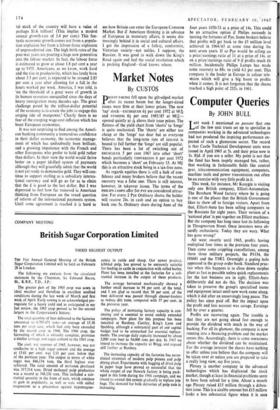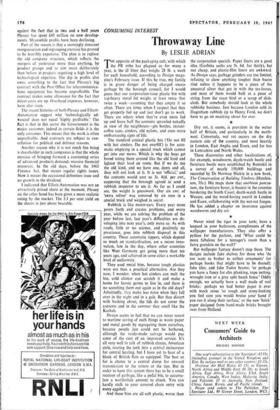Computer Queries
By JOHN BULL
I AST week I mentioned en passant that one of the few unit trusts set up to specialise in companies working in the advanced technologies
had not produced the inspiring performance ex- pected of such a glamorous sector. The record is that Castle Technical Development units were issued in April 1965 at 5s. and their price now is 3s. 814. if you are a seller. My point is not that the fund has been ineptly managed but, rather, that working in fashionable fields like control gear, telecommunication equipment, computers, machine tools and power transmission can often be an exercise with very little profit in it.
This week, for instance, Mr Kosygin is visiting only one British company, Elliott-Automation. The Boreham Wood factory where he is going is one of the places that the British Government likes to show off to foreign visitors. Apart from that, Elliott-Auto has been selling computers to the Russians for eight years. Their version of a 'national plan' is put together on Elliott machines. But the company has long since lost its following in Throgmorton Street. Once investors were ab- surdly enthusiastic. Today they are wary. What has gone wrong?
All went sweetly until 1965, profits having multiplied four times in the previous four years. Then came some crippling cancellations, among them three military projects, the P1154, the HS681 and the TSR2. Overnight a gaping hole appeared in the group order book. Standard prac- tice when this happens is to close down surplus plant as fast as possible unless quick replacements for the lost business are in sight. Elliott-Auto deliberately did not do this. The decision was taken to preserve the group's specialised teams and equipment intact until new work came along, which it did after an unnervingly long pause. The policy has since paid off. But the impact upon the profit and loss account was savage. Earnings fell by over a quarter.
Profits are recovering again. The trouble is that they are not going ahead fast enough to provide the dividend with much in the way of backing. For all its glamour, the company is now running into a financing problem and the market senses this. Accordingly, there is some uneasiness about whether the dividend can be maintained. For the average investor the shares have nothing to offer unless you believe that the company will be taken over or unless you are prepared to take a really long view, say five years.
Plessey is another company in the advanced technologies which has displeased the stock market, though at least its financial problems seem to have been solved for a time. About a month ago Plessey raised £15 million through a deben- ture issue. This is a sizable amount but £15 million looks a less substantial figure when it is seen
against the fact that in two and a half years Plessey has spent £45 million on new develop- ments. Meanwhile profits have been declining.
Part of the reason is that a seemingly innocent reorganisation and regrouping exercise has proved to be horribly expensive. The plan is to replace the old company structure, which reflects the mergers of yesteryear more than anything, by product groups and to aim more deliberately than before at projects requiring a high level of technological expertise. The dip in profits also owes something to the fact that Plessey's big contract with the Post Office for telecommunica- tions equipment has become unprofitable. The contract makes some allowance for the fact that direct costs are up. Overhead expenses, however, have also risen.
The recent histories of both Plessey and Elliott- Automation suggest why 'technologically ad- vanced' does not equal 'highly profitable.' The fact is that in this sector the Government is the major customer, indeed in certain fields it is the only customer. This means that the work is often unprofitable. And contracts are subject to can- cellation for political and defence reasons.
Another reason why it is not much fun being a shareholder in such companies is that the whole exercise of bringing forward a continuing series of advanced products demands massive financial resources. In the old days, before the 1965 Finance Act, that meant regular rights issues. Now it means the occasional debenture issue and no growth in the dividend.
I indicated that Elliott-Automation was not an attractively priced share at the moment. Plessey on the other hand has been given a more realistic rating by the market. The 5.3 per cent yield on the shares is just about bearable.



































 Previous page
Previous page